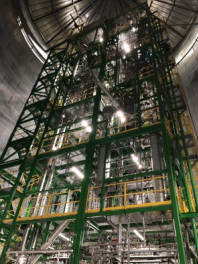Anellotech is pleased to announce that it has, for the first time, continuously processed solid, post-consumer plastic waste into light olefins and aromatics using its Plas-TCat™ catalytic pyrolysis technology. The waste consisted of a mixture of all major plastic types (Figure 1), with the exception of polyvinyl chloride (PVC).

The processing trial took place at Anellotech’s TCat-8TM fully automated, 30 meter tall pilot plant near Houston, Texas (Figure 2, video here). That plant’s nameplate capacity is 0.5 tons per day, and Plas-TCat’s scalable fluidized bed reactor design provides a path to larger commercial production plants capable of addressing substantial global recycling goals.
Plas-TCat employs one thermal catalytic reactor to convert a broad range of mixed waste plastics into the same valuable chemical feedstocks used today to make virgin plastics. These include benzene, toluene and xylene (BTX) as well as ethylene, propylene and butylene (light olefins). Based on a proprietary catalyst and fluid bed reactor-regenerator system, Plas-TCat provides a new, direct route to light olefins and aromatics from heterogeneous plastic waste streams—without the need for steam cracker furnaces.
The technology can effectively process a wide range of waste plastics, alone or within composites. This
includes polyolefins, polyamides (nylon), PET, polycarbonate and polystyrene. With the completion of these continuous process runs Plas-TCat is now at Technology Readiness Level (“TRL”) 6. Trials planned for later in 2022 will be run to confirm promising laboratory yields for Plas-TCat (see Plas-TCat update and
Anellotech presentation).
“Plas-TCat is advantageous due to its high olefin and aromatic hydrocarbon selectivity, high scalability, broad feedstock tolerance, as well as its substantial carbon dioxide emissions savings compared to industrial steam crackers,” says David Sudolsky, President and CEO of Anellotech. “The TCat-8 unit will be used in future month-long 24/7 trials to prove the robustness of the process and generate process performance data over an equilibrated catalyst, which are required to design a commercial plant.”








